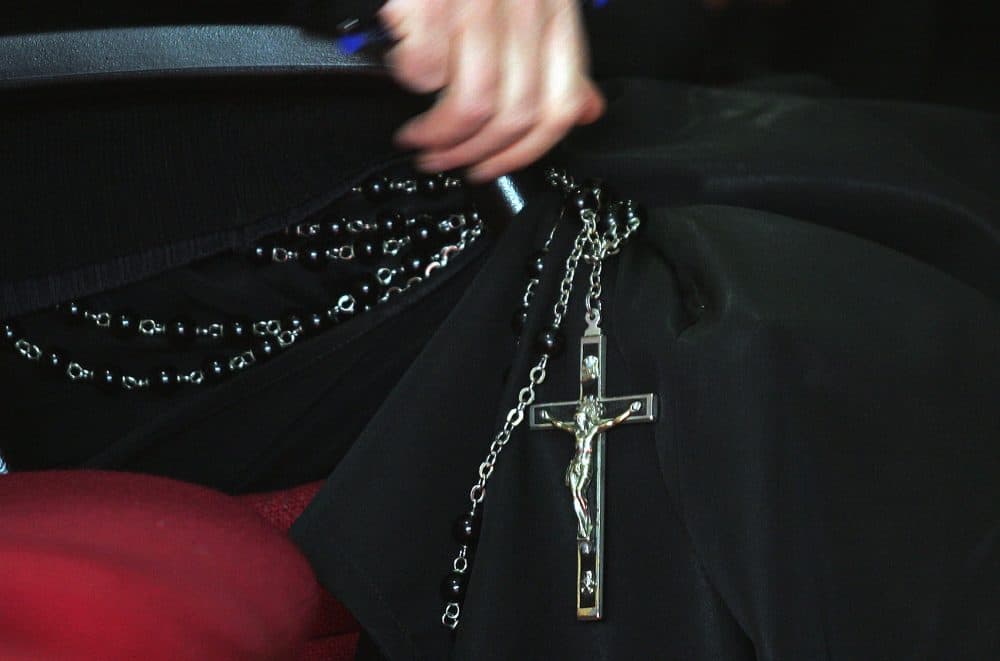Advertisement
Demand For Exorcisms On The Rise, Says One American Priest Who Conducts Them

More than 200 priests from around the world recently traveled to Rome for an annual Vatican training course on how to perform exorcisms, the ritual used by the Catholic Church to free people who are believed to be possessed by demons.
Demand for exorcisms is on the rise. But one practitioner says they're not performed the way you might have seen in the movies.
"An exorcism at its very core is an official prayer of the church," says Vince Lampert, official exorcist for the Archdiocese of Indianapolis. "So oftentimes people might be more interested in the theatrics or the sensationalism, but it really is a prayer, whereby God is asked to bring relief into the life of the person who is suffering."
Here & Now's Eric Westervelt (@Ericnpr) speaks with Lampert (@FrVinceLampert), also pastor at St. Malachy Parish in Brownsburg, Indiana, about the ritual and why more people are seeking it out.
"Early on, I would probably get about five calls a week," Lampert says. "Currently, in 2017, I received an average of 30 calls a week."
Interview Highlights
On the different types of exorcisms
"I've done many, many exorcisms. There's different degrees of extraordinary demonic activity. The church recognizes demonic possession, but it also recognizes demonic infestation, the presence of evil in a location or with an object, demonic vexation, physical attacks and then demonic obsession, mental attacks. So it could be that ... I've done literally thousands of exorcisms when it comes to infestation, vexation and obsession."
On whether he was skeptical of the ritual at first
"I believe in the reality of evil, but the church also moves very methodically, because the church wants to make sure that a person gets the true help that they need. Just because somebody says they're possessed doesn't mean that the church necessarily believes that's the case. So there is a process or a protocol that's used before the church gets to that determination."
"Early on, I would probably get about five calls a week. Currently, in 2017, I received an average of 30 calls a week."
Vince Lampert
On how to determine whether someone is simply suffering from a mental illness, as opposed to being possessed by the devil
"That's a great question, because an exorcist is trained to be a skeptic. So the church does require a person that believes that they're dealing with extraordinary demonic activity, if they're possessed, to have a complete psychiatric evaluation, because the church wants experts in the mental health field to weigh in so that the church can make sure that this is something not just of a mental nature. The church also requires the person to have a physical examination by a medical doctor.
"It's important to note that the church is not asking the mental health expert or the medical doctor if a person is possessed. The church always makes that determination herself, but the church does want to experts in these areas to weigh in on the matter so that the church can reach a level of moral certitude before proceeding with the ritual of exorcism."
On what might be behind the rising demand
"I believe because faith in general seems to be declining in the Western world. And so I always say that belief in God leads us in one direction, and the lack of belief in God will lead us in another."
On whether an exorcism performed via cellphone or Skype would be considered legitimate
"That would not be legitimate. The church would say that an exorcism has to be done in person. The truth is, and I believe this, that if the church moves too hastily, then perhaps she might label someone as being possessed, when in reality they might need the help of a good mental health expert, or to go see their medical doctor. And then the church will be doing greater harm than good."
This article was originally published on April 20, 2018.
This segment aired on April 20, 2018.